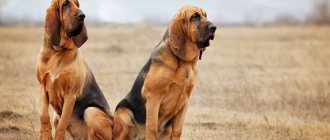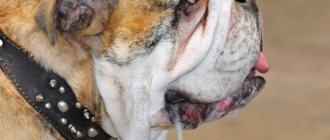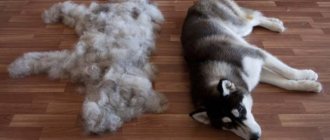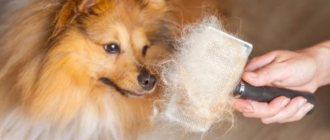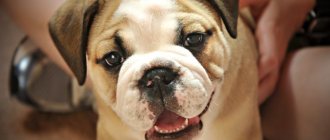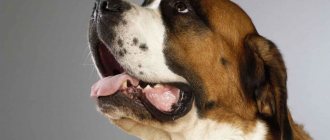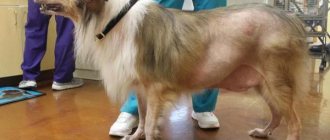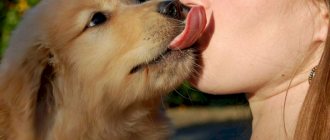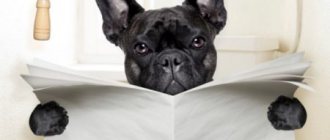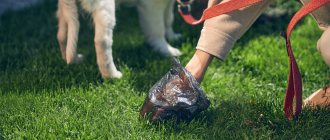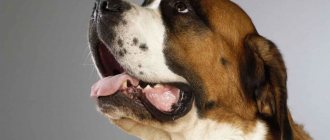Increased salivation in dogs worries the owners. When there are no signs of disease, you are annoyed by damage to upholstered furniture. Saliva causes allergies in children. If you do not wash your hands, there is a risk of infection with worms and other contagious diseases common to dogs and humans.
In the article, I described 12 causes of increased salivation and recommendations for them. You will learn when severe drooling is normal, and in what cases your pet needs to be treated.
List of the most slobbery breeds.
Causes of hypersalivation
Saliva is the secretion of the salivary glands (sublingual, parotid, submandibular) that enters the mouth. It is a colorless transparent liquid. The role of saliva is its antibacterial effect, protecting the oral cavity from the proliferation of pathogenic bacteria due to the content of antiviral elements in it.
In addition, it helps dogs digest food by moistening hard pieces before swallowing.
The norm for saliva production is 1 liter per day (for a medium-sized dog), but when feeding dry food, more is produced. Exceeding the volume indicates dysfunction of the glands responsible for secretion production. A number of factors contribute to this:
- Dental diseases. Caries, stomatitis, tartar, and periodontal disease cause painful sensations that the body tries to neutralize through copious secretion of saliva.
- Dislocation of the jaw. The dog is unable to close its mouth, causing it to constantly drool.
- Ear diseases. Near the ears are the large parotid glands, which help produce saliva. In the presence of injuries, inflammations, tumors, fungal infections in the ears, the glands begin to intensively produce secretions.
- Viral infections - rabies, parvovirus enteritis, leptospirosis, canine distemper. These are very dangerous diseases that threaten not only the dog, but also its owner.
- Chronic pathologies - diseases of the gastrointestinal tract, liver, kidneys, spleen, gall bladder, ulcers, tumors, gastritis
- Gynecological disorders, for example, diseases of the uterus.
- Poisoning, botulism. A dog can be poisoned by low-quality or heavy foods (fatty meat, sweets), toxic substances (poison, household chemicals), garbage, etc. Penetrating into the stomach, toxic substances irritate the organ and cause an outflow of bile and gastric juice.
- Licking and eating certain types of lizards and toads.
- Stress. A change of residence, separation from the owner, the appearance of another pet in the house, and even a regular trip to the veterinary clinic by car can cause strong psycho-emotional stress and, as a result, hypersalivation.
- Heatstroke. Overheating causes evaporation of saliva, which activates the processes of thermoregulation, increased blood supply to the tongue and hypersalivation.
- Helminthiasis. With helminthic infestation, salivation is accompanied by vomiting.
- Portosystemic shunt.
- Epilepsy. Drooling is usually a warning sign of an epileptic seizure.
- Traumatic brain injury.
- Insect bites if the dog tries to eat them.
- Tumors, cysts of the salivary glands or oral cavity.
- Diseases of the immune system.
Veterinarians also note a number of causes of hypersalivation that are not associated with pathological processes. For example, salivation can be caused by the entry of a foreign body into the oral cavity - fragments of bones, branches, etc. In females, copious saliva is secreted during pregnancy due to hormonal imbalance. In puppies, hypersalivation is observed during the period of teeth change.
Many owners notice increased salivation in their dog when trying to give it medication. And finally, the activity of the salivary glands is activated before eating, after excessive physical activity - these are normal phenomena that do not require medical intervention.
Pathologies of the oral cavity
A sudden increase in salivation may indicate a disease in the dog's mouth or a foreign body entering it. An object stuck between teeth or embedded in the gum may be indicated by a small amount of blood mixed with saliva. This could be a splinter of a bone caught in food, a pebble or a twig picked up during a game.
An indirect sign of a problem is that the dog shakes its head, whines, tries to remove an interfering object from its mouth with its paw, and does not allow one to touch its muzzle. The foreign object must be removed from the mouth as quickly as possible, and the damaged area must be treated with any disinfectant. If the object is deeply embedded, inflammation or an abscess is discovered, the animal must be taken to a specialist as quickly as possible.
The second problem with excessive saliva in the mouth is problems with teeth. Yes, contrary to popular belief, a person’s friends also suffer from caries, gingivitis, and tartar. Dental problems manifest themselves in swelling on the face, noticeable during a visual examination of the mouth, and the disease can be guessed by the unpleasant odor emanating from the pet. In this case, only a veterinarian can solve the problem.
Sometimes saliva appears due to an incorrect bite, which prevents the dog from eating food normally. Bitches with hormonal imbalance or an analogue of toxicosis that occurs during pregnancy immediately after mating sometimes suffer from the same problem.
Which breeds are more susceptible
In representatives of some breeds, hypersalivation is due to peculiarities of the anatomical structure. These are dogs with massive muzzles, loose, fleshy jowls and shortened jaws:
- Shar-Pei;
- Maltese;
- bulldogs;
- boxers;
- Saint Bernards;
- Newfoundlands;
- mastiffs,
- Great Danes;
- Caucasian Shepherd Dogs;
- bloodhounds.
These dogs drool for any reason: in cold or hot weather, before eating, out of joy or excitement. You can often notice saliva on them during sleep. The phenomenon, which is called false ptyalism, is not considered a serious fault of the breed, but many breeders try to prevent dogs that are too “loose” from being bred.
When choosing a puppy, it is advisable to pay attention to its parents. If they are constantly slobbering and getting everything dirty, then their babies will be the same. In this case, all that remains is to accept it and constantly wipe the dog’s face.
When can you not worry about your pet’s health?
Normal situations when you don’t have to worry about the animal’s condition:
- When preparing food in the presence of a pet, a reflex is triggered, the dog’s digestive system begins to activate and the salivary glands intensively secrete secretions.
- Occasional eating of grass is considered normal behavior in an animal. In this way, the pet cleanses the stomach of undigested food components. In this case, the dog bites off grass on the street and after a while coughs and regurgitates it back along with saliva.
- Another possible reason why a dog is drooling outdoors could be marks from other pets (especially those left by females during estrus).
- After physical exercise and in hot weather, the dog drinks a large amount of liquid, while drooling like water.
- With emotional manifestations (both joyful and negative).
Main symptoms
The signs leading to hypersalivation are varied, therefore, the clinical picture will vary. Thus, dental problems are indicated by decreased appetite, careful and slow absorption of food, itching in the jaw area, and drooping head. The dog constantly whines, growls, including at the owner, and reacts inadequately to touches on the face.
When poisoned, the dog experiences severe thirst, vomiting and diarrhea. He often experiences fever and pale mucous membranes. Saliva is thick.
Viral infections are characterized by a sharp decrease in appetite, lethargy, apathy, fever, and increased thirst.
In any case, if hypersalivation occurs in combination with other signs, you should immediately contact a veterinary clinic.
Infections caused by viruses
Every pet can get sick; fever, dry nose, refusal to eat, increased thirst, apathy are reasons to consult a specialist. And an increased amount of drool may indicate a viral disease contracted by the dog.
The list of viral diseases carried by animals includes:
- carnivore plague,
- hepatitis,
- enteritis,
- tracheobronchitis,
- parainfluenza
All these diseases can be treated exclusively in a veterinary hospital.
Diagnostics in a veterinary clinic
When contacting a specialist, the owner must tell in detail about the dog’s lifestyle, peculiarities of keeping and feeding, contacts with other animals, medications used recently, and other symptoms. The veterinarian’s task is to differentiate normal drooling from salivation, accompanied by gagging and smacking.
To diagnose the disease, the veterinarian will conduct a complete neurological and physical examination of the animal (special attention to the oral cavity and neck area) and diagnostic tests, including a complete blood count (general, biochemical), urine tests, stool tests, ultrasound, x-rays, biopsy ( if a disorder of the immune system is suspected), washings from the mucous membranes.
About preventing excessive salivation
The most effective preventive measure is timely vaccination of the animal. The main preventive measures also include sanitary standards for keeping dogs, feeding hygiene, and regular antiparasitic procedures. It is important to limit your pet’s contact with stray animals as much as possible. If you notice persistent excessive salivation in your dog, you should immediately contact your veterinarian. A timely diagnosis and prompt medical care significantly increase the chances of a full recovery.
Treatment method and prognosis
There is no single treatment regimen for hypersalivation. After identifying the cause that caused the excessive secretion of saliva, the doctor develops it on an individual basis, based on the diagnosis, the animal’s health condition, age, etc.
For dental diseases and tumors, teeth cleaning and surgery are used. Removal of a foreign body, if the owner could not get it at home, may require the use of anesthesia and sedation. Antibiotics and antiviral drugs are used to treat oral infections and inflammatory diseases.
If a dog's drooling is accompanied by nausea and vomiting, it is prescribed maintenance therapy with adjustments to nutrition and fluid administration.
As for the prognosis, it all depends on the root cause. If hypersalivation was caused by a dangerous disease such as rabies, which cannot be treated, then the prognosis is unfavorable.
Chronic illnesses
Like humans, our furry friends also suffer from chronic diseases, some of which cause increased thirst, causing the dog to increase water intake and, as a result, produce more saliva. Excessive salivation signals an exacerbation of a chronic disease:
- gastrointestinal tract (ulcers, gastritis may occur),
- liver
- gallbladder.
Sometimes a similar symptom occurs in bitches suffering from false pregnancy.
What to do at home
The first thing an owner should do if they notice unusual drooling in their pet is to carefully examine the oral cavity. There may be a foreign body stuck there that needs to be removed. If a wound has formed in your mouth, it should be disinfected. A veterinarian's help may only be required if the wound becomes suppurated.
If a dog drools profusely before eating or after excessive exercise, the owner does not need to do anything. As soon as the pet eats or calms down, the process of copious salivation will stop.
If you experience stress caused by traveling in a car, you need to train your dog to travel. It is better to start with small distances, gradually increasing them. This trains the animal's vestibular apparatus. Over time, your four-legged pet will understand that traveling in a car does not threaten him with anything terrible.
It happens that a dog gets very nervous at shows. In such cases, it is advisable to walk him more often, introduce him to other people and animals, and change the environment. It is advisable to seek the help of a dog handler. If the situation is severe, the veterinarian may prescribe sedatives, homeopathic remedies, and herbal decoctions.
If the owner is sure that the dog has been poisoned, he can provide first aid to it using products intended for humans. Activated carbon and Enterosgel are suitable. However, if the symptoms of poisoning do not go away, it is necessary to show the animal to a veterinarian.
Small puppies are always gnawing on something during the period of changing teeth, as a result of which saliva constantly flows from their mouths. No worries. This is a normal physiological phenomenon. When baby teeth are replaced by molars and the gums stop bothering the baby, excessive salivation will stop. The only thing the owner can do to help the puppy is to provide him with as many toys as possible that he can chew.
Stressful situations
Excessive saliva manifests itself as a reaction associated with the animal’s psyche, most often due to stress experienced. In this case, the animal may develop a tic, its jaw will twitch nervously, churning saliva into a copious foam.
This may be caused by:
- departure of the owners who left the pet with strangers,
- change of place of residence,
- a fight provoked by another animal,
- excessive zeal in training,
- the appearance of a “competitor” in the person of a newborn,
- constant punishment from the owners.
In this case, it is necessary to resolve the issue by obtaining recommendations from a veterinarian; most likely, they will prescribe sedatives. You can offer your pet a treat or take it with you for a long walk. Just give him maximum attention, show that everyone still loves him. After returning home, you need to pay attention to the dog for several days.
Travel can sometimes be stressful, but most dogs still love to travel with their owners. But if, nevertheless, the animal is frightened, it is necessary to give sedatives, stroke it, and, if possible, take the pet in your arms. When motion sickness occurs, you need to train the dog, gradually accustoming it to transport or pre-administering special medications.
Traveling with a slobbering dog is not the most pleasant situation; here you need to stock up on bibs, absorbent diapers and napkins. If the cabin is hot, then there will definitely be saliva; here, if possible, you need to turn on the air conditioning or provide access to cool air. As an option, stop more often to allow your pet to catch its breath.
Occasionally, the cause of stress, the consequence of which is drooling, is caused by the close presence of a female dog in heat; this is a normal reaction for a mature male.
First aid
If, however, preventive measures did not help, and it so happened that the dog began to actively salivate, and the process is accompanied by other symptoms, you should immediately respond to the situation.
You need to follow the dog for some time and record the main points. If salivation is increased without other factors, you need to contact a veterinary clinic and report your observations.
In any case, the doctor can determine the disease based on symptoms and external observations, and then prescribe certain tests and treatment.
If the dog is seasick and the process of hypersalivation is a consequence of this, you need to give the pet sedatives. If you suspect poisoning, give him plenty of fluids, provide him with rest, and the next day make sure that the animal is fasting.
The role of saliva
Saliva is a vital serous-mucosal secretion secreted by 3 pairs of large and several small glands located in the dog’s mouth. Its functions:
- moisturizes the oral mucosa;
- promotes the recognition of the taste of food and the production of gastric juice;
- facilitates the passage of food into the stomach;
- improves food digestion;
- neutralizes and removes toxins.
Antimicrobial substances in saliva help disinfect wounds, which is why they say: “heals like a dog.”
How to avoid
Of course, it is always easier to prevent the cause than to eliminate it.
Therefore, it is best to take preventive measures to avoid anxiety with your pet:
- Maintain hygiene not only in keeping, but also in feeding your pet;
- Vaccinate your dog against infectious diseases and rabies in a timely manner. You can get a comprehensive vaccination against the main types of disease;
- At a certain interval, carry out treatment against parasites, both external and internal;
- Periodically visit a veterinary clinic to monitor the dog’s health with the help of specialists;
If hypersalivation is observed before feeding, you should consider a nutritional plan. It is possible that the portion is not enough for your pet to be completely satisfied, so you can adjust the weight of the food at one time.
